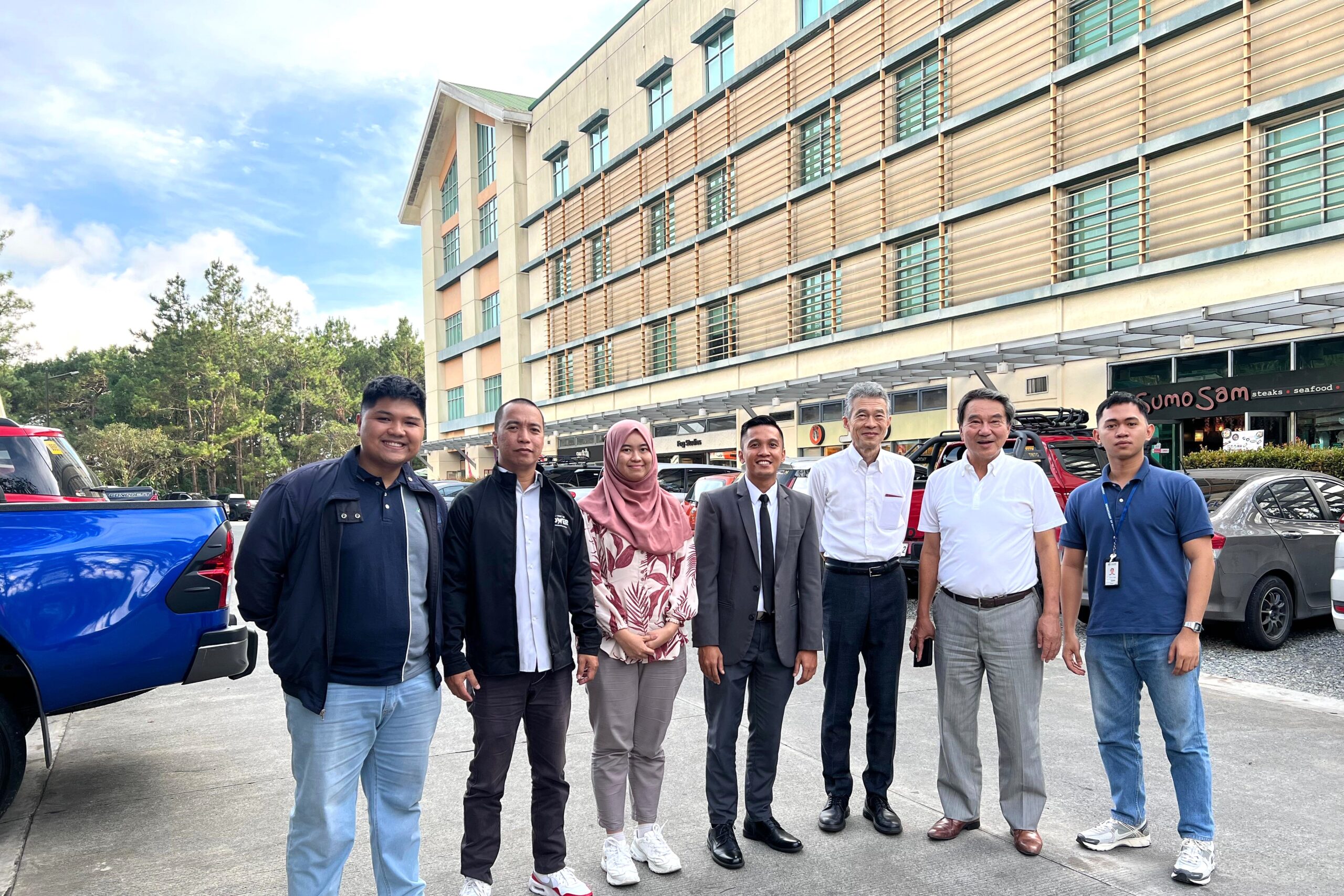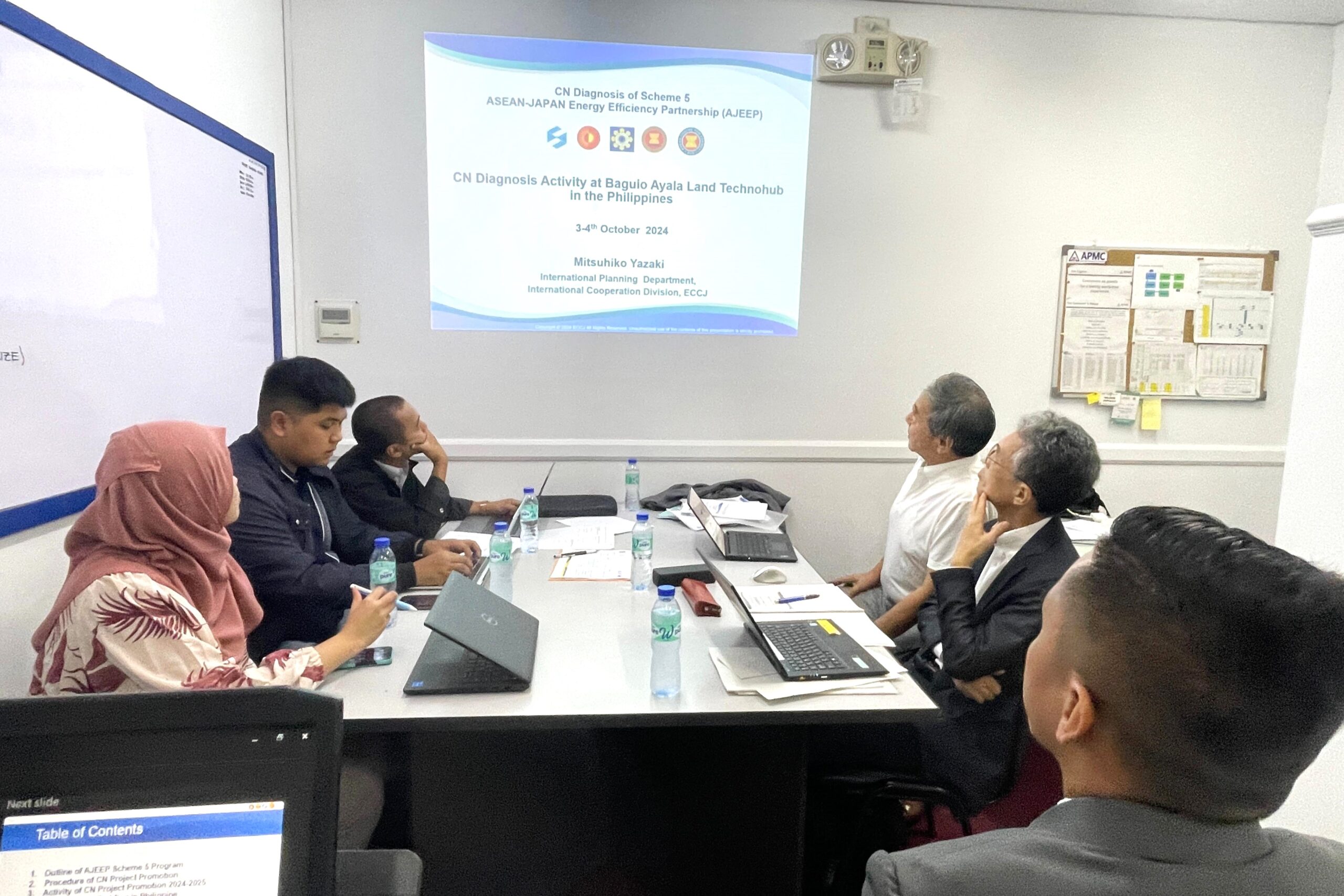Menu

Photo 1. Participants of the AJEEP CN Diagnosis at Baguio AyalaLand Technohub
The ASEAN Centre for Energy (ACE), in collaboration with the Energy Conservation Center Japan (ECCJ), conducted a Carbon Neutrality (CN) diagnosis for a building at Baguio AyalaLand Technohub in the Philippines. Representatives from ACE, ECCJ, the Department of Energy (DOE) as the EE&C-SSN focal point for the Philippines, and Baguio AyalaLand Technohub participated in a CN diagnosis held on 5-7 November 2024. Prior to the CN Diagnosis, a survey visit was conducted on 3-4 October 2024.
CN diagnosis at Baguio AyalaLand Technohub was the third in 2024, following similar assessments in Indonesia and Lao PDR. In 2023, a CN diagnosis was successfully conducted in Thailand. Under the ASEAN-Japan Energy Efficiency Partnership (AJEEP) Scheme 5, the capacity building program aims to identify potential CO2 emissions reduction and energy consumption savings in the selected building. By utilising simulation software, Zero Energy Building (ZEB) retrofit proposal will be made to realise the energy efficiency improvements.

Photo 2. Discussion at Baguio AyalaLand Technohub
During the two-day survey visits in October, the team conducted a preliminary survey with Baguio AyalaLand Technohub to explain the CN Diagnosis activity and gather detailed information about the building. This included specifics on the building structure (windows, exterior walls, floors), as well as the air conditioning, ventilation, and lighting systems. Based on the survey visit, the BPO-B building, a four-story structure with approximately 6,000 m2 of office and retail space, was selected as the focus for the diagnosis.
The CN diagnosis continued in November to collect measurement data. This involved monitoring temperature, humidity, and CO2 concentrations in both outdoor and major air-conditioned areas over a 24-hour period to assess the current state of the air-conditioning system. Additionally, thermography was used to capture thermal images of key areas, such as windows in major air-conditioned spaces, to identify significant heat gain and loss points. The three-day diagnosis also includes an illuminance measurement to assess the office and common area lighting.

Photo 3. CN Diagnosis Activities at the Baguio AyalaLand Technohub
Additional data such as electricity consumption data, air conditioning system in the office area, CO2 conversion factors of diesel fuel and electricity from the electric power company, time of shifts and number of people in each shift are also collected. The information and data are necessary for understanding the outlines of the building, energy consumption which will then be analysed using simulation tools.
On the final day, the discussion identified areas for improvement, particularly regarding thermal data collected from the ground floor to the fourth floor. The measured temperature range of 24.2°C to 33.3°C suggests potential adjustments. Additionally, illuminance levels were measured in various spaces, including offices, hallways, lavatories, and gym areas. The results suggested that a lighting upgrade to LED would improve system efficiency.

Photo 4. Photo Group with CN Diagnosis Participants
Following the CN diagnosis at the building, an online interim meeting is scheduled for February 2025 to share the data analysis and preparation of the ZEB retrofit design. In August 2025, a start-up meeting will be held to outline a medium-to-long-term strategy for CO2 reduction. The company will then take the necessary steps to achieve its CO2 reduction goals.
About Project:
ASEAN-Japan Energy Efficiency Partnership (AJEEP) is a regional cooperation initiative between ASEAN and Japan, under the ASEAN Senior Officials Meeting on Energy and Japan’s Ministry of Economy, Trade, and Industry (SOME-METI) Work Programme 2024-2025. Since 2012, implemented by ACE and ECCJ with financial support from METI, AJEEP has aimed to build capacity and narrow the gap between AMS on EE&C policies and measures. Starting in 2022, AJEEP entered into new Scheme 4 and Scheme 5. AJEEP Scheme 5 focuses on promoting advanced technologies for energy use toward Carbon Neutrality in the industry, building, and transportation through capacity building programmes.
